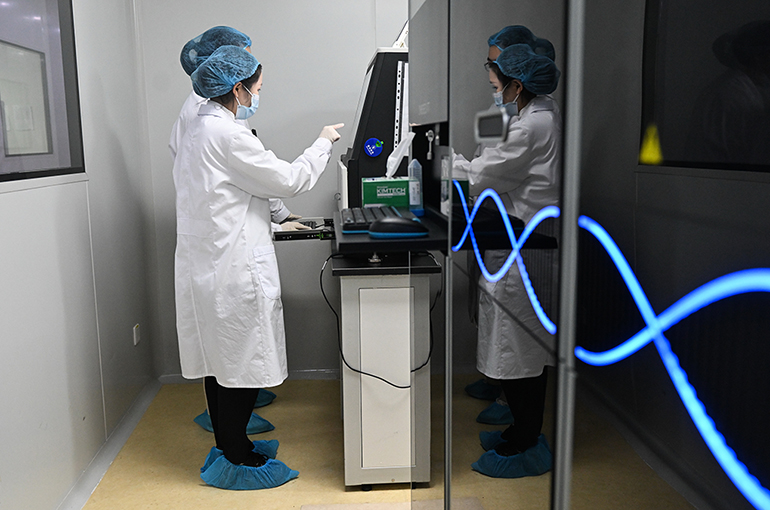 China’s Domestic Sequencers Take Bigger Market Share in First Half After Illumina Import Ban
China’s Domestic Sequencers Take Bigger Market Share in First Half After Illumina Import Ban(Yicai) Sept. 11 -- The Chinese market share of domestically made genome-sequencing products has increased in the first half of the year, as the country imposed an import ban on US gene-sequencing equipment giant Illumina early this year.
A total of 123 entities signed contracts worth about CNY249 million (USD35 million) for 179 gene-sequencing machines in the Chinese market in the six months ended June 30, according to data released by third-party bidding and procurement service platform bidizhaobiao.Com yesterday.
The top three players in the Chinese gene sequencer market by procurement amount were China's MGI Tech and Berry Genomics and their US peer Thermo Fisher Scientific in the first half of this year, with the first two having a cumulative market share of 59.3 percent, and the third a share of 14.4 percent, the data also showed.
In comparison, only MGI made it into the top three in the first half of last year, with a market share of 50 percent. Illumina and Thermo Fisher had a total market share of 16.2 percent.
Amid increasing trade tensions with the United States, China's commerce ministry added Illumina to its unreliable entity list on Feb. 4, citing national security concerns, and announced a ban on imports of the San Diego-based company's gene sequencers on March 4.
The market share of Chinese gene-sequencing equipment in China increased in the first half, and MGI's installation volume grew significantly in the period, reaching a record high, Liu Jian, the company's executive vice president, told Yicai.
MGI's long-read gene sequencer sales surged more than 60 percent to over 700 units between January and June from a year earlier, setting a new record, according to the firm's semiannual earnings report.
But with the increasing share of domestic gene-sequencing firms in the Chinese market, the price competition has intensified.
"To capture larger market shares and sample resources, some small- and medium-sized companies have adopted ultra-low pricing strategies, which poses a great challenge to the overall health of the industry," the management team of MGI said during the semiannual earnings conference call.
The price war is eroding the profitability of Chinese gene-sequencing firms. MGI's adjusted gross profit margin shrank to 8 percentage points to 52.9 percent in the first half from a year earlier, while the gross profit margins of Berry Genomics and Novogene narrowed 2.7 percentage points and 0.9 percentage point, respectively.
The business model of Chinese gene-sequencing companies relies on using equipment as a market entry point, with the core source of profitability coming from the sales of consumables and services in the later stages. Therefore, seizing a larger share of the gene-sequencing equipment market means locking in downstream customers and obtaining higher long-term service revenue.
However, such companies need to move away from the mindset of competing for market share through low pricing strategies to avoid a continuous decline in profit margins.
Editors: Tang Shihua, Futura Costaglione